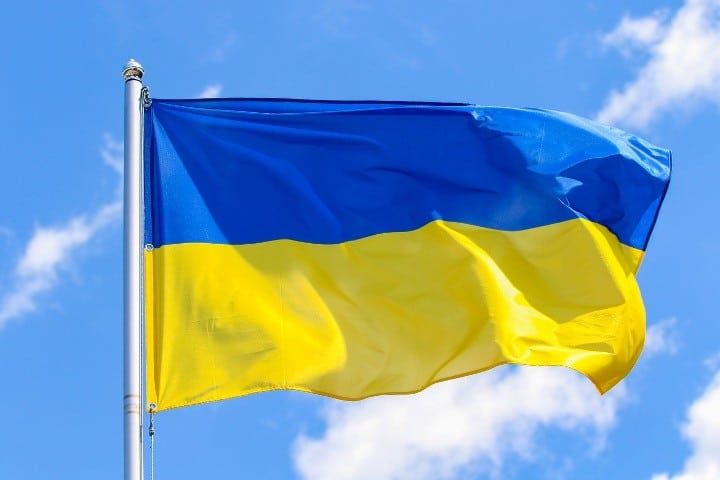
According to results of a Ukrainian public-opinion survey about attitudes toward the current crisis with Russia, most Ukrainian respondents harbored misgivings toward the military bloc NATO and the European Union (EU).
The survey, which was conducted by phone from July 25 to 27 in all of Ukraine presently unoccupied by Russian forces and provided exclusively to The European Conservative, revealed that of Ukrainians over the age of 18, 84 percent remained optimistic for the future of their country.
Nonetheless, 71 percent of respondents opined that NATO and the EU are pursuing actions in Ukraine for their own self-interest.
More than half of respondents — 61 percent — felt that NATO and the EU only supported Ukraine because the situation would benefit them, believing that NATO and the EU may participate in closed talks with Russia on peace settlements. Only 29 percent of respondents felt that NATO would include Ukraine within its ranks by next year.
Although around 50 percent thought that the conflict with Russia would cease by 2024, most uncertain about what would happen should fighting cease. Fifty-six percent stated that Ukraine would remain indebted to the West for Western arms and aid granted during the conflict.
Interestingly, the aforementioned survey respondents remained generally upbeat about countries such as the United Kingdom and United States, with 81 percent thinking that both countries are reliable allies.
While Ukrainian trust in NATO and the EU remained low, a CNN survey conducted by independent research company SSRS recently indicated that most Americans currently object to deploying more aid to Ukraine.
The SSRS poll found that 56 percent of Americans opposed further aid to Ukraine to fight the conflict against Russia, and 51 percent indicated that America had already done enough to help Ukraine fend off the Russians.
This comes amid recent allegations that the head of an enlistment office in Odessa, Yevhen Borisov, was charged for taking in as much as 4.6 million euros in bribes in exchange for declaring men as unfit for military service.
Borisov was arrested by Ukrainian authorities and accused of having charged men as high as 9,000 euros each to state on their official documents that they were unfit for active combat service.
The accused official aroused the suspicions of Ukrainian authorities after his mother purchased a 3.7-million euro home in Spain in 2022 despite him making only 1,500 euros monthly and his mother only making around 100,000 euros in the last 20 years.
The Ukrainian Ministry of Defense has alleged that there are 106 current probes into conscription offices, with 21 employees already declared suspicious and employees in several regions arrested due to charges of bribery thus far.
Despite their distrust of NATO and the EU, respondents seemed to have a positive view about neighboring Poland as an individual country. Poland has been a steadfast supporter of Ukraine since the outbreak of the Russo-Ukrainian conflict in February last year, although bilateral ties took a nosedive owing to a recent spat over grain exports.
Marcin Przydacz, the head of Polish President Andrzej Duda’s international policy office, raised eyebrows among Ukrainian officials when questioned about a possible extension of an existing grain import ban from Ukraine implemented to help Polish farmers. “Ukraine has really received a lot of support from Poland. I think it would be worth them starting to appreciate the role that Poland has played for Ukraine in recent months and years,” he said.
Ukrainian Prime Minister Denys Shmyhal slammed Poland for the latter’s decision to continue the grain ban, saying:
Russia has disrupted the grain initiative, destroying the infrastructure of our Black Sea ports and once again provoking a global food crisis. During this critical time, Poland intends to continue blocking the export of UA grain to the EU. This is an unfriendly and populist move that will severely impact global food security and Ukraine’s economy.
Meanwhile, the Ukrainian Secret Service (SBU), arrested a woman on August 7 for an alleged attempt on Ukrainian leader Volodymyr Zelensky’s life when the leader was traveling in the Mykolaiv region of southern Ukraine, based on a BBC report.
An SBU press release characterized the woman as “a Russian secret service informant who was gathering information about the President’s planned visit to the Mykolaïv region.” Her goal was to stage a “massive air attack,” based on SBU claims, while her role was to reveal the whereabouts and times of Zelensky’s visit to the region.
The charges against this woman could date back prior to August 7, as Zelensky had visited the Mykolaiv region twice, namely, in June after the destruction of the Kakhovka dam, and in July after a series of bombings.
While the SBU had already singled out the culprit some time back, they refrained from arresting her immediately in order to garner as much intel as possible about her and other people involved in the planning of the attacks. Based on the SBU’s reports, the woman supposedly tried to obtain details on the location of Ukrainian electronic warfare systems and ammunition warehouses. She was caught red-handed trying to transmit information to the Russian secret services, and could face up to 12 years in prison for her actions.
Also, last weekend, top representatives of 42 countries, including America, China, and India, gathered either in person or remotely in Jeddah, Saudi Arabia, to draw up major principles that could hopefully function as a launchpad for ending the conflict in Ukraine.
Significantly, Russia was not present at the gathering, though it was able to observe the proceedings, calling into question the future feasibility of the Jeddah talks. Russian President Vladimir Putin recently stated that Russian troops would not cease their actions in Ukraine while Ukrainian forces were “on the offensive.”
According to an Al Arabiya report, the Jeddah talks did not culminate in an official statement, but participants agreed to have another series of talks later this year.
Quoting the Saudi Press Agency, Al Arabiya reported that the “participants have agreed on continuing international consultations and exchanging views in a way that contributes to building common grounds that pave the way for peace.” They also underscored “the importance of benefitting from the positive opinions and suggestions that were discussed during the meeting.”
The basis of last weekend’s talks was Ukraine’s 10-step peace plan, launched by Zelensky last November. As a prerequisite for peace, the plan demands that Russian troops leave Ukraine and that nuclear, food, and environmental security guarantees be given to Ukraine. Zelensky said previously that he hoped the initiative would conclude in a “peace summit” of world leaders this autumn to back the principles he outlined in his peace plan.
In a statement published on August 6, Andriy Yermak, head of Zelensky’s office, said all parties had “an extremely honest, open conversation, during which representatives of each country could voice their position and vision.”
Not surprisingly, Zelensky’s insistence on the complete restoration of Ukraine’s territory constitutes a roadblock to normalization of Russo-Ukrainian ties. He is demanding that Russia return not only the land it annexed after the outbreak of the conflict last year, but also the Crimean Peninsula, which it annexed in 2014, following that year’s Maidan Revolution that led to regime change in Kyiv.
Kremlin spokesman Dmitry Peskov has stated that Russia has no plan to return the land it annexed.
When asked during an interview with The New York Times whether Russia wants to increase its hold on more Ukrainian territories, Peskov dismissed such statements, saying that Moscow only desires to “control all the land we have now written into our Constitution as ours.”



